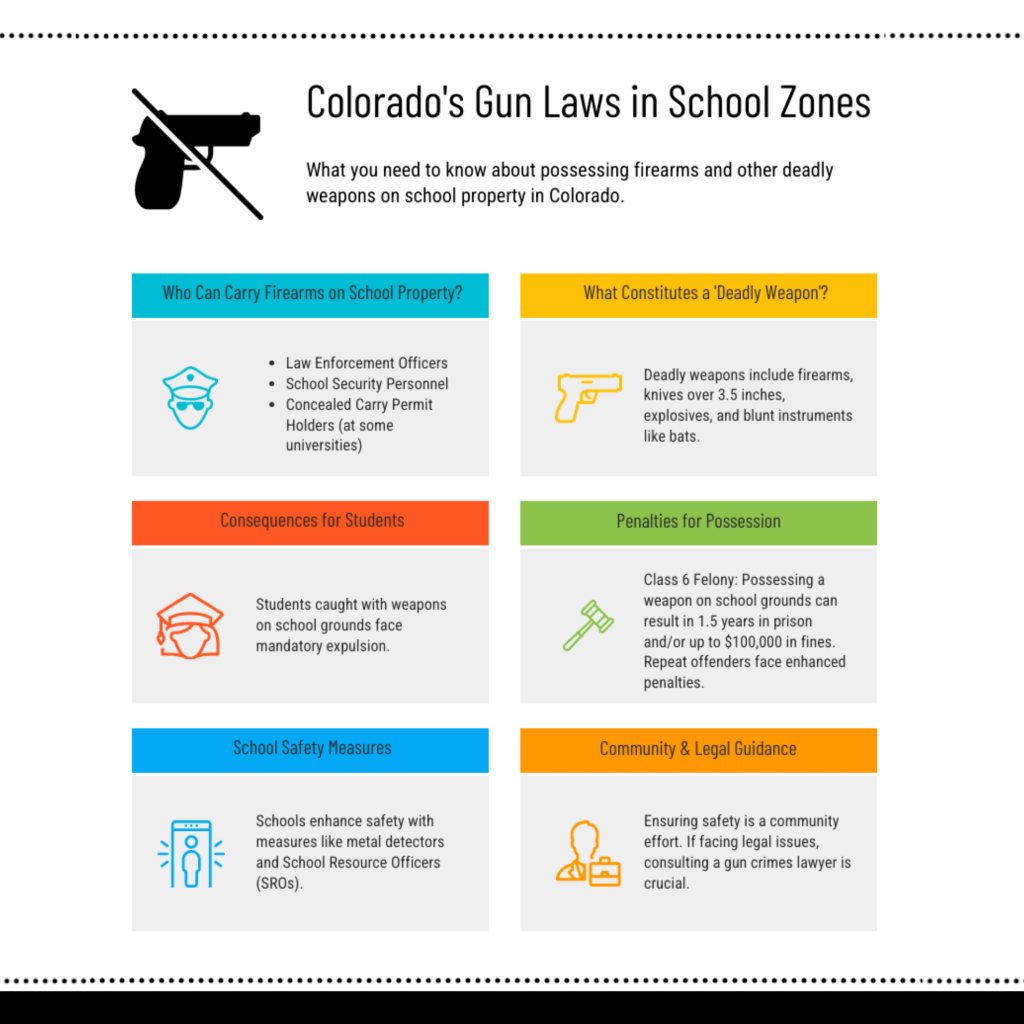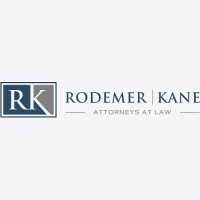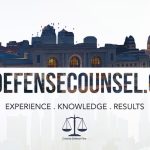Colorado is known for its breathtaking mountain ranges and vibrant cities, but it also has a complex set of laws when it comes to firearms, especially those governing concealed carry in school zones.
Whether you’re a parent, student, teacher, or just a concerned citizen, understanding these laws is crucial for ensuring the safety of our children and compliance with regulations. This post delves into the intricacies of Colorado gun laws on school property, the rules around concealed carry in a school safety zone, and the severe consequences of possessing a deadly weapon in these sensitive areas.
Table of Contents
- Can I Carry a Gun on School Property in Colorado?
- Gun-Free School Zones Act: A Federal Perspective
- State Laws on Firearms in Schools
- Is Bringing a Gun to School a Felony?
- Possessing a Deadly Weapon in a School Safety Zone: What You Need to Know
- Consequences of Possessing a Deadly Weapon in a School Safety Zone
- Self-Defense and Deadly Weapons: What’s Allowed?
- School Safety Zones in Colorado: Enhancing Student Security
- Are Colorado Gun Laws Strict? Exploring Controversies in School Safety Zones
- Navigating Colorado Gun Laws in School Zones
Given the potential legal ramifications, consulting a knowledgeable attorney is essential if you’re involved in any firearm-related legal matter on or near school grounds. An experienced lawyer can help you navigate Colorado’s strict gun laws and safeguard your rights.

Can I Carry a Gun on School Property in Colorado?
When it comes to carrying a gun on school property, Colorado has stringent regulations aimed at preventing potential threats to student safety. Federal laws, like the Gun-Free School Zones Act of 1990, set the foundation for many state laws, but Colorado has its own unique statutes and interpretations that govern firearms on school grounds that must be understood.
Gun-Free School Zones Act: A Federal Perspective
The Gun-Free School Zones Act prohibits the possession of firearms within 1,000 feet of public, private, or parochial elementary and secondary schools. However, states have the authority to enact more restrictive laws, and Colorado has done just that.
State Laws on Firearms in Schools
In Colorado, it is illegal to possess a firearm on school property unless you meet specific exemptions. According to Colorado Revised Statutes (C.R.S.) § 18-12-105.5, a person commits a class 6 felony if they knowingly possess a firearm on school grounds without authorization.
This law makes it a crime to knowingly possess a deadly weapon on the grounds of any public or private:
- Elementary School
- Middle School
- Junior High School
- High School
- Vocational School
- College
- University
- Seminary
This applies to all types of firearms, from handguns to rifles, and even extends to some non-lethal weapons.
Exemptions to the Rule
It’s important to know that Colorado law does allow concealed handgun permit holders to carry their weapons at colleges and universities. However, private institutions have the right to impose restrictions on concealed carry. Additionally, public institutions might have the ability to prohibit concealed carry in specific facilities through certain contractual agreements.
While the law is strict, there are exemptions:
- On-Duty Law Enforcement Officers: Officers performing official duties are allowed to carry firearms on school property.
- School Security Personnel: Authorized school security staff can carry firearms if permitted by the school district.
- Concealed Carry Permit Holders: In certain situations, individuals with a valid concealed carry permit may be exempt, but this is highly restricted and usually not applicable within the school building itself.
Is Bringing a Gun to School a Felony?
Under Colorado statute CRS 18-12-105.5, bringing a gun to school—defined as the unlawful possession of a deadly weapon on school property without proper authority—is a Class 6 felony punishable by up to 1½ years in prison and/or a fine of up to $100,000.
Repeat offenses or aggravating circumstances can lead to enhanced penalties, including longer prison terms and higher fines. In addition to firearms, possessing a dangerous weapon—such as a knife or explosive device—on school property also constitutes a Class 6 felony, carrying similar penalties:
- 1 to 1½ years in prison, with at least one year of mandatory parole, and/or
- A fine ranging from $1,000 to $100,000.
On the other hand, certain firearm-related offenses may be classified as a Class 1 misdemeanor. For instance, possession of a firearm on school grounds under specific circumstances could lead to penalties such as:
- Up to 364 days in jail, and/or
- A $1,000 fine.
Colorado’s laws aim to ensure strict compliance with school safety regulations, underscoring the importance of understanding the legal implications of possessing any weapon on school property.
Impact on Your Second Amendment Rights
A felony conviction for possessing a deadly weapon in a school safety zone can result in the permanent loss of your right to own or carry firearms under federal law. This is a serious consequence for gun owners, emphasizing the importance of understanding and adhering to the school zone gun laws in Colorado.
Possessing a Deadly Weapon in a School Safety Zone: What You Need to Know
The term “deadly weapon” extends beyond just firearms and can include items like knives, explosives, and other tools that can cause serious injury or death. In Colorado, possessing any of these within a school safety zone is a criminal offense with severe repercussions.
What Constitutes a Deadly Weapon?
Under Colorado law, a deadly weapon is defined as any object, device, or instrument capable of inflicting death or serious bodily injury. This includes:
- Firearms: Handguns, rifles, shotguns, and even some BB guns or airsoft guns.
- Knives: Blades over a certain length, typically 3.5 inches, can be considered deadly weapons.
- Explosives: Bombs, grenades, and other explosive devices fall under this category.
- Blunt Instruments: Items like baseball bats, crowbars, and even certain heavy tools can be considered deadly if used with intent to harm.
The Law on Possessing Deadly Weapons in a School Safety Zone
In Colorado, possessing a deadly weapon within a school safety zone is illegal unless authorized by the appropriate authorities.
The school safety zone in Colorado refers to not only the school property itself but also includes areas in proximity to the school, encompassing playgrounds, parking lots, and other surrounding areas. “School zone” means an area that is designated as a school zone and has appropriate signs posted. The state or local government having jurisdiction over the placement of traffic signs and traffic control devices in the school zone area shall designate when the area will be deemed to be a school zone.
Unintentional Possession: A Gray Area
One of the most controversial aspects of this law is its application to unintentional possession. For example, if a student accidentally brings a knife to school in their backpack, they could still face criminal charges, though the circumstances of each case are taken into consideration.
Consequences of Possessing a Deadly Weapon in a School Safety Zone
The penalties for violating this law are severe and can include:
- Felony Charges: Depending on the weapon and circumstances, charges can range from a class 6 felony to a class 3 felony.
- Expulsion for Students: Students caught with deadly weapons face mandatory expulsion from school, often leading to further educational and social consequences.
- Long-Term Criminal Record: A conviction can result in a permanent criminal record, affecting employment opportunities, housing, and other aspects of life.
Self-Defense and Deadly Weapons: What’s Allowed?
Colorado’s self-defense laws do allow for the use of deadly weapons in defense of oneself or others, but this does not generally apply within a school safety zone. The law is designed to protect students and staff, and the introduction of weapons, even for self-defense, is highly discouraged and likely illegal.
School Safety Zones in Colorado: Enhancing Student Security
Colorado school safety zone initiatives are designed to create a secure environment for students, staff, and visitors. These zones are intended to be weapon-free, promoting a safe learning environment where the focus remains on education rather than the threat of violence.
Security Measures in School Safety Zones
Schools across Colorado have implemented various security measures to enhance safety, including:
- Metal Detectors: Some schools use metal detectors to prevent weapons from being brought onto campus.
- Security Cameras: Surveillance systems monitor school grounds to detect and deter criminal activity.
- School Resource Officers (SROs): Many schools employ SROs who are trained law enforcement officers tasked with maintaining safety and addressing criminal behavior.
The Role of School Resource Officers
SROs play a critical role in enforcing Colorado gun laws on school property. They are responsible for:
- Responding to Incidents: Quickly addressing any situations involving weapons or threats of violence.
- Educating Students: Providing education on the dangers of weapons and the importance of adhering to the law.
- Building Trust: Acting as a bridge between law enforcement and the student body, fostering a sense of safety and security.
Community Involvement in School Safety
Ensuring the safety of school zones is not just the responsibility of law enforcement but also the entire community. Parents, teachers, and students all play a role in maintaining a secure environment.
This includes reporting suspicious activity by encouraging students and staff to report any suspicious behavior or potential threats. Teaching students about the dangers of weapons and the serious consequences of possessing them in a school safety zone is also important.
There is strength in numbers, the power of community members who come together can advocate for stronger laws or additional security measures to protect schools.
Are Colorado Gun Laws Strict? Exploring Controversies in School Safety Zones
Colorado gun laws, particularly those regulating firearms on school property, are widely regarded as strict. They impose stringent penalties for violations, such as the unlawful possession of a deadly weapon on school grounds, which is classified as a felony under state law. Colorado’s regulations often go beyond federal standards, such as the Gun-Free School Zones Act, by adding specific provisions and penalties.
The Debate Over Gun Laws, School Safety and The Second Amendment
While these laws are designed to protect students, they remain controversial. Critics argue that Colorado’s regulations, including restrictions in school safety zones, infringe on Second Amendment rights. Responsible gun owners often feel penalized for carrying firearms near schools, even if they pose no threat.
Balancing Safety and Rights
Proponents of strict gun laws maintain that the safety of children and educators must take precedence over individual gun rights. They argue that the potential risks associated with firearms in schools justify the stringent measures, leaving little room for leniency.
The Future of Gun Laws in Colorado School Zones
The debate over gun laws in Colorado school zones continues to evolve. Some lawmakers advocate for stricter regulations to enhance school safety, while others push for relaxed rules to ensure gun owners’ rights are protected.
These ongoing discussions will shape public perception and influence whether Colorado’s laws are seen as appropriately strict or overly restrictive.
Navigating Colorado Gun Laws in School Zones
Understanding Colorado gun laws on school property and the implications of possessing a deadly weapon in a school safety zone is essential for anyone living in or visiting the state. The laws are designed to protect students and staff, but they also carry serious consequences for those who violate them.
As the conversation around gun laws and school safety continues, it’s crucial to stay informed and engaged. Whether you’re a parent, educator, or concerned citizen, knowing the law is the first step in keeping our schools safe. If someone does find themselves facing legal issues related to firearms in these sensitive areas, consulting a gun crimes lawyer can be invaluable for navigating the complex legal landscape and ensuring fair representation.
In the end, the goal is clear: to create a secure environment where students can learn and grow without the threat of violence. By understanding and respecting Colorado’s gun laws, we can all contribute to a safer future for our children.



